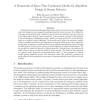402 search results - page 19 / 81 » Agent modeling with individual human behaviors |
ATAL
2004
Springer
15 years 3 months ago
2004
Springer
Spurred by a range of potential applications, there has been a growing body of research in computational models of human emotion. To advance the development of these models, it is...
AIED
2005
Springer
15 years 3 months ago
2005
Springer
The research literature investigating the construction of tutorial dialogue and learning companion environments present parallel experiences in attempting to emulate what has been ...
EPIA
2009
Springer
15 years 4 months ago
2009
Springer
Although several formal models of emotions for intelligent agents have recently been proposed, such models often do not formally specify how emotions influence the behavior of an ...
SWARM
2008
SPRINGER
14 years 9 months ago
2008
SPRINGER
Designing and analyzing self-organizing systems such as robotic swarms is a challenging task even though we have complete knowledge about the robot's interior. It is difficul...
KI
2009
Springer
15 years 4 months ago
2009
Springer
To be sociable, embodied interactive agents like virtual characters or humanoid robots need to be able to engage in mutual coordination of behaviors, beliefs, and relationships wit...


